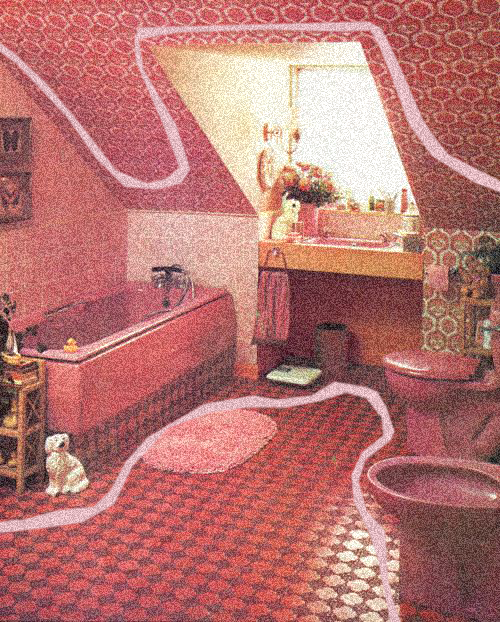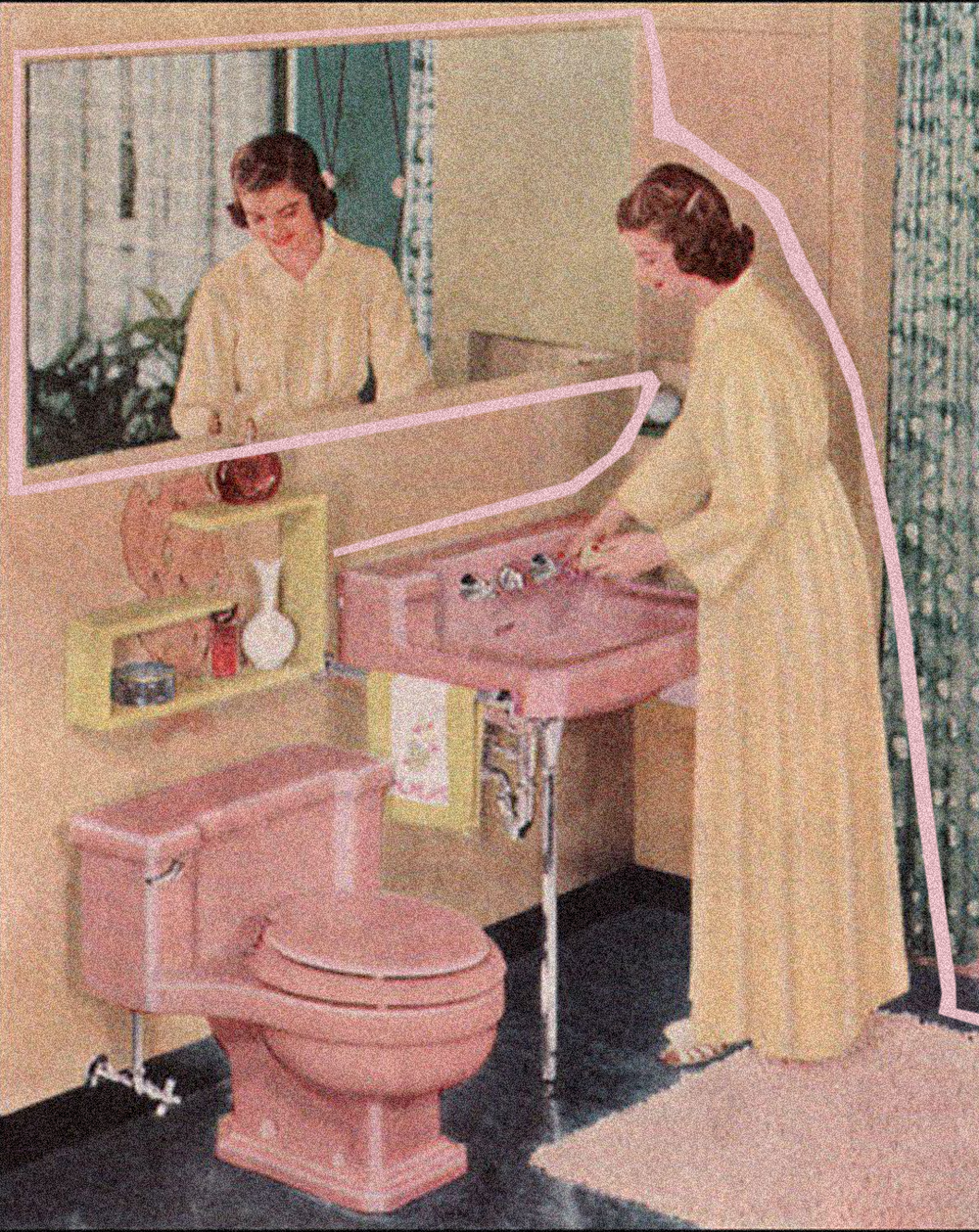The Dread of Being a Teenager in Disabled Toilets
When I was fifteen, I got yelled at for using the disabled toilets at a train station cafe. All colour drained from my face as I was publicly reprimanded for being in there for too long, that I was taking up valuable space for people in need, that it was a sanctuary that I’d obstructed for ten whole minutes. It was an ordeal that left me petrified. I remember trying to stare down at my battered school shoes to avoid her gaze, only to have my head snatched back up by her curt tone slicing through the air, telling me to raise my chin and take the wrap for the pain I’d caused her.
It wasn’t the first or last time this happened. Although this event was one of the more scarring.
You could say that I suffer from being perpetually eyeballed by old ladies upon leaving the disabled loo in costa coffees up and down the country. God knows what I was doing in there, definitely not being ill, that’s for sure.
Because I don’t look it, so I cant be. Because I’m fifteen in a school skirt that’s been rolled up at the waist, paired with mascara so clumpy I struggle to detach my longest lash from the bottom lash when I open my eyes and a blazer so square that I look less like a sophisticated school girl and more like a recent recruitee of the Heathers. I’m a kid. Kids can’t get that sick.
I wish I had a more luxurious illness. You know the kind that keeps you bedridden for a day or so while loved ones feed you banana on toast and pat your head until you garner enough strength to slide out of bed into your pre-warmed dressing gown and slippers to then reposition yourself by the TV as a sign your ‘feeling better’ but not ‘better better’.
___STEADY_PAYWALL___
That was my first thought upon being diagnosed with Crohn’s disease at the age of twelve. My second thought was that I would probably get a pity takeaway tea out of this predicament due to the look on my mother’s face. I was right about that one; I did get a KFC. I don’t think I remember much of what I felt but more of what I saw. Which was my just mum looking quite shaken as I popped popcorn chicken into my mouth. This all started with chicken, actually. I used to take two hours to finish a meal on average. My lovely family would buckle up for the longest dinners of their lives because they never left me alone to eat, because they thought it was rude. Which was kind of them, but sometimes I really wished they would’ve just left me and my plate to battle it out between the two of us. My relationship with food confused even myself. It was the fact I could inhale a burger, had the most stacked plate at any barbecue, and could rip through so much chicken at Nando’s that a server once felt moved enough to give me a ‘cer-chick-ficate’ for the number of wings I consumed. Yes, it was that breathtaking a scene. But regardless of my undeniable carnivorous quality, I couldn't even think of a bowl of pasta without feeling sick. Fruit tasted like acid, vegetables were cardboard and gluten was the devil incarnate. I was incapable of clearing a balanced plate, so my body began to backslide. I had to wear three thermals when I played hockey each winter, I was by far the shortest in my class, and I was always completely and utterly exhausted. There was a point in time where it hurt to eat. A moment where if you’d told me that I could just drink water for the rest of my life, I wouldn’t of hesitated to say yes. I would’ve been so perfectly content doing that.
With my sickly companion finally named and explained, I was told that sometimes, now that I was on this slew of new medication, the disabled toilets may be best used. Now my logic was this. That if I couldn’t get a cast to parade around school, if I wasn’t actually allowed any time off, if the only thing that may change was the fact that I’d eat bread and enjoy it, that two years of testing and grilling from doctors who just wanted you to admit you were anemic and be done with it all amounted up to this, then by god I was going to use those disabled toilets if and when I needed to. So I did. As nervous as I was, I didn’t stop using the disabled loos when I needed to. I don’t do it all the time because it isn’t required all the time, but for when it is necessary, I need to know how to do it without feeling like a fraud. I feel like I have to make up excuses to use it, but I don’t have to. I’m ill. All the time. It’s like my whole thing. But the judgemental table of mothers and babies who need the changing facilities don’t know that. The baristas I sometimes have to ask for access look me up and down at the counter each time I broach the subject. The student sipping on an oat flat white burns holes in the back of my head when I lay a finger on the door handle. Because I don’t look ill. I’m only 23. I look younger than my little sister. I’m always ID’d because I’m only 23. I go drinking and get a hangover that’s worse than when I was 18, but I’m 23, so it won’t be as bad as when I’m not 23. The peak of health. Every year from 18 is a year closer to the inevitable, but at 23, you’re closer to 18 than the inevitable. So, according to that logic, this is my health peak. It’s a low peak. Not super low because I’m not super sick, but I’m sick enough. My peak’s more of a Ben Nevis than an Everest.
“Because I’m always going to have off days, I’m always going to need my medication, and I will always need to smile extra hard when requesting the bathroom key.”
To be young is to be full of boundless energy. So why does my act of vivacity take precedent over the reality that, yes, I’m in the pub tonight exchanging tales of hot colleagues and hook-ups with my best friend, but last weekend I was sobbing down the phone to her from my bed feeling like I may never attain the vigour to leave it ever again? Is it possible to get imposter syndrome for an illness that actually you have? Because some days, I feel like I’ve made it all up.
To have a chronic illness is to be forever on the defensive. As many of those with chronic conditions can attest to, sometimes even your doctors won't fully understand what's actually wrong with your body. It is simply exhausting. The belief that health and youth are inevitably entwined has caused a long-lasting strain not only within my initial diagnosis but also within how I've gone on to navigate my own life. If I could go back to that day when I was fifteen, trembling in a tea shop by the train station platform, I don’t think I would’ve reacted any differently. I know better than to yell at the elderly. But I also now know better than to assume that the world will change any quicker than it can to accommodate those like myself with invisible illnesses. That I’m going to be shot stares frequently until I stop dying my hair, invest in a bag more sensible than a tote and maybe gain some happy wrinkles around my eyes. That shouldn’t be the case, but I’m aware that it will be. Maybe by the time I get all that, there will be teenagers in disabled toilets who don’t have to wrestle toilet keys off baristas without whipping out their entire medical history. That people may just be believed for the sake of being believed. My crohns has always felt bigger than me, so it’s always been hard putting it into words. Even back then and even more so now, I find my vocabulary on the subject shortening perpetually. It’s like the more time I spend with it, the less I know it, which is strange for an entity I’d consider myself to have grown up with. But it’s here, and I can learn to live with it. As long as strangers can remember to accept her too. Because I’m always going to have off days, I’m always going to need my medication, and I will always need to smile extra hard when requesting the bathroom key.
Words: Lucy Norie


